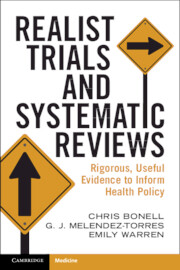
-
Select format
-
- Publisher:
- Cambridge University Press
- Publication date:
- February 2024
- February 2024
- ISBN:
- 9781009456616
- 9781009456609
- Dimensions:
- Weight & Pages:
- Dimensions:
- (234 x 156 mm)
- Weight & Pages:
- 0.22kg, 134 Pages
You may already have access via personal or institutional login
Book description
This book describes an innovative approach to the evaluation of complex health interventions, assessing what interventions work, how and for whom. Rejecting the stalemate between trials and realist evaluation, it draws on the best of both. Randomised controlled trials and systematic reviews offer the least biased means of assessing intervention effects but tell us little scientifically about how interventions work. Policy-makers and practitioners are also not supported to decide which interventions are likely to achieve most benefits in their local contexts. Realists use other forms of evaluation and evidence synthesis exploring how intervention mechanisms interact with context to generate outcomes. But these approaches lack rigour in assessing causality. This book proposes how realist evaluation methods may be incorporated within randomised controlled trials and systematic reviews. This enables evaluations and evidence synthesis to benefit from the more nuanced questions posed within realist enquiry while maintaining rigour in assessing causality.
Contents
Metrics
Altmetric attention score
Full text views
Full text views help Loading metrics...
Loading metrics...
* Views captured on Cambridge Core between #date#. This data will be updated every 24 hours.
Usage data cannot currently be displayed.
Accessibility standard: Unknown
Why this information is here
This section outlines the accessibility features of this content - including support for screen readers, full keyboard navigation and high-contrast display options. This may not be relevant for you.
Accessibility Information
Accessibility compliance for the PDF of this book is currently unknown and may be updated in the future.


